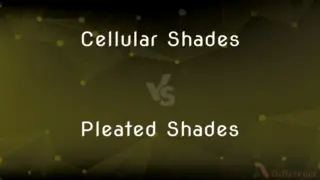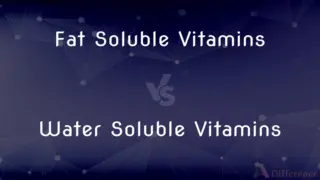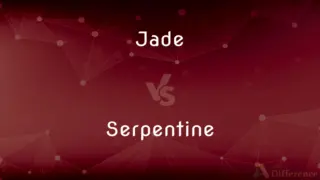Fog vs. Mist — What's the Difference?
By Tayyaba Rehman — Updated on October 5, 2023
Fog is a thick cloud of tiny water droplets suspended in the atmosphere at or near the earth's surface, reducing visibility; Mist is a lighter, less dense form of this phenomenon, causing slight obscurity.

Difference Between Fog and Mist
Table of Contents
ADVERTISEMENT
Key Differences
Fog is denser than mist, often leading to more significant reductions in visibility. While both are made up of tiny water droplets, the concentration in fog is usually much higher.
Both fog and mist form when the temperature drops to the dew point, and the air is saturated with moisture. However, fog typically forms under stable conditions with little wind, whereas mist can form under slightly more unstable conditions.
Fog tends to persist for longer periods, especially in conditions where there is little wind to disperse it. In contrast, mist usually dissipates more quickly, especially when the sun emerges.
Due to its denser nature, fog can severely impact transportation, especially air and road traffic, due to reduced visibility. Mist, being lighter, usually has a less pronounced effect on daily activities.
Fog often gives the impression of a thick cloud blanket enveloping a region. Mist provides a lighter, more ethereal appearance, often adding a picturesque quality to landscapes.
ADVERTISEMENT
Comparison Chart
Meteorological Definition
A thick cloud of tiny water droplets suspended in the atmosphere at or near the earth's surface that obscures or restricts visibility
A phenomenon caused by small droplets of water suspended in air, which allows visibility of at least 1,000 meters
Visibility
Reduces visibility to less than 1 km
Allows visibility of 1-2 km
Thickness
Thicker and denser
Thinner and less dense
Word Length
Comprises of three letters
Comprises of four letters
Usage in Idioms/Phrases
"A foggy idea" suggests something unclear
"Lost in the mist" can imply being in an unclear or undefined situation
Compare with Definitions
Fog
A substance that resembles fog in being spread out diffusely.
He sprayed a Fog of insect repellent around the camp.
Mist
A light cloud of tiny water droplets suspended in the atmosphere.
The mountains were shrouded in a gentle Mist.
Fog
To cover or obscure with or as if with fog.
The windows Fogged up due to the humidity.
Mist
To spray or sprinkle with or as if with mist.
He Misted the plants with water daily.
Fog
Fog is a visible aerosol consisting of tiny water droplets or ice crystals suspended in the air at or near the Earth's surface. Fog can be considered a type of low-lying cloud usually resembling stratus, and is heavily influenced by nearby bodies of water, topography, and wind conditions.
Mist
Mist is a phenomenon caused by small droplets of water suspended in air. Physically, it is an example of a dispersion.
Fog
A thick cloud of tiny water droplets suspended in the atmosphere at or near the earth's surface which obscures or restricts visibility (to a greater extent than mist; strictly, reducing visibility to below 1 km)
The collision occurred in thick fog
Mist
A cloud of tiny water droplets suspended in the atmosphere at or near the earth's surface that limits visibility (to a lesser extent than fog; strictly, with visibility remaining above 1 km)
The peaks were shrouded in mist
A mist rose out of the river
Fog
A state or cause of perplexity or confusion
The coffee helped clear the fog in my brain
Mist
Cover or become covered with mist
The windows of the car were misted up with condensation
The glass was beginning to mist up
Fog
The grass which grows in a field after a crop of hay has been taken.
Mist
A mass of fine droplets of water in the atmosphere near or in contact with the earth.
Fog
(with reference to a glass surface) cover or become covered with steam
The windscreen was starting to fog up
Hot steam drifted about her, fogging up the window
Mist
Water vapor condensed on and clouding the appearance of a surface.
Fog
Bewilder or puzzle
She stared at him, confusion fogging her brain
Mist
Fine drops of a liquid, such as water, perfume, or medication, sprayed into the air.
Fog
Spray with an insecticide.
Mist
A suspension of fine drops of a liquid in a gas.
Fog
Condensed water vapor in cloudlike masses lying close to the ground and limiting visibility.
Mist
Something that dims or conceals.
Fog
An obscuring haze, as of atmospheric dust or smoke.
Mist
A haze before the eyes that blurs the vision.
Fog
A mist or film clouding a surface, as of a window, lens, or mirror.
Mist
Something that produces or gives the impression of dimness or obscurity
The mists of the past.
Fog
A cloud of vaporized liquid, especially a chemical spray used in fighting fires.
Mist
A drink consisting of a liquor served over cracked ice.
Fog
A state of mental vagueness or bewilderment.
Mist
To be or become obscured or blurred by or as if by mist.
Fog
Something that obscures or conceals; a haze
Shrouded their actions in a fog of disinformation.
Mist
To rain in a fine shower.
Fog
A blur on a developed photographic image.
Mist
To conceal or veil with or as if with mist.
Fog
A new growth of grass appearing on a field that has been mowed or grazed.
Mist
To moisturize (plants or dry air, for example) with a fine spray of water.
Fog
Tall, coarse grass left standing in fields through the winter.
Mist
Water or other liquid finely suspended in air. fog, haze.}}
It was difficult to see through the morning mist.
Fog
To cover or envelop with fog.
Mist
(countable) A layer of fine droplets or particles.
There was an oily mist on the lens.
Fog
To cause to be obscured; cloud.
Mist
(figurative) Anything that dims, darkens, or hinders vision.
Fog
To make vague, hazy, or confused
A memory that had been fogged by time.
Mist
To form mist.
It's misting this morning.
Fog
To obscure or dim (a photographic image).
Mist
To spray fine droplets on, particularly of water.
I mist my tropical plants every morning.
Fog
To be covered with fog.
Mist
To cover with a mist.
The lens was misted.
Fog
To be blurred, clouded, or obscured
My glasses fogged in the warm air.
Mist
(of the eyes) To be covered by tears.
My eyes misted when I remembered what had happened.
Fog
To be dimmed or obscured. Used of a photographic image.
Mist
To disperse into a mist, accompanying operation of equipment at high speeds.
Fog
(uncountable) A thick cloud that forms near the ground; the obscurity of such a cloud. mist, haze.}}
A bank of fog
Mist
Visible watery vapor suspended in the atmosphere, at or near the surface of the earth; fog.
Fog
(uncountable) A mist or film clouding a surface.
Mist
Coarse, watery vapor, floating or falling in visible particles, approaching the form of rain; as, Scotch mist.
Fog
A state of mind characterized by lethargy and confusion.
He did so many drugs, he was still in a fog three months after going through detox.
Mist
Hence, anything which dims or darkens, and obscures or intercepts vision.
His passion cast a mist before his sense.
Fog
(photography) A silver deposit or other blur on a negative or developed photographic image.
Mist
To cloud; to cover with mist; to dim.
Fog
(computer graphics) Distance fog.
Mist
To rain in very fine drops; as, it mists.
Fog
A new growth of grass appearing on a field that has been mowed or grazed.
Mist
A thin fog with condensation near the ground
Fog
Tall and decaying grass left standing after the cutting or grazing season.
Mist
Become covered with mist;
The windshield misted over
Fog
(Scotland) Moss.
Mist
Make less visible or unclear;
The stars are obscured by the clouds
Fog
(intransitive) To become covered with or as if with fog.
Mist
Spray finely or cover with mist
Fog
(intransitive) To become obscured in condensation or water.
The mirror fogged every time he showered.
Mist
To become covered with condensed moisture.
The mirror Misted up after the hot shower.
Fog
To become dim or obscure.
Mist
A fine spray or atomized liquid.
She applied a refreshing facial Mist.
Fog
To make dim or obscure.
Mist
An indistinct or hazy appearance.
There's a Mist of uncertainty surrounding the event.
Fog
To spoil (film) via exposure to light other than in the normal process of taking a photograph.
Fog
(transitive) To cover with or as if with fog.
Fog
(transitive) To disperse insecticide into (a forest canopy) so as to collect organisms.
Fog
(transitive) To obscure in condensation or water.
Fog
(transitive) To make confusing or obscure.
Fog
To practice in a small or mean way; to pettifog.
Fog
(transitive) To pasture cattle on the fog (of), or aftergrass, of; to eat off the fog from (a field).
Fog
(intransitive) To become covered with the kind of grass called fog.
Fog
A second growth of grass; aftergrass.
Fog
Watery vapor condensed in the lower part of the atmosphere and disturbing its transparency. It differs from cloud only in being near the ground, and from mist in not approaching so nearly to fine rain. See Cloud.
Fog
A state of mental confusion.
Fog
Cloudiness or partial opacity of those parts of a developed film or a photograph which should be clear.
Fog
To pasture cattle on the fog, or aftergrass, of; to eat off the fog from.
Fog
To practice in a small or mean way; to pettifog.
Where wouldst thou fog to get a fee?
Fog
To envelop, as with fog; to befog; to overcast; to darken; to obscure.
Fog
To render semiopaque or cloudy, as a negative film, by exposure to stray light, too long an exposure to the developer, etc.
Fog
To show indistinctly or become indistinct, as the picture on a negative sometimes does in the process of development.
Fog
Droplets of water vapor suspended in the air near the ground
Fog
An atmosphere in which visibility is reduced because of a cloud of some substance
Fog
Confusion characterized by lack of clarity
Fog
Make less visible or unclear;
The stars are obscured by the clouds
Fog
A thick cloud of tiny water droplets near the ground reducing visibility.
The city was enveloped in a dense Fog this morning.
Fog
Confusion or lack of clarity in thought or perception.
His judgment was clouded by a Fog of emotions.
Fog
A state of mental dullness or bewilderment.
After the accident, she was in a Fog for days.
Common Curiosities
Can Mist evolve into Fog?
Yes, under the right conditions, mist can thicken and become fog.
How does the thickness of Fog differ from Mist?
Fog is denser and thicker than mist, leading to greater reductions in visibility.
Does Fog always last longer than Mist?
Generally, fog persists longer than mist, especially without wind to disperse it.
How do Fog and Mist affect driving conditions?
Fog can severely reduce visibility, making driving hazardous, while mist might cause slight obscurity but is generally less dangerous.
Do Fog and Mist only occur during specific times of the day?
While common during early mornings or evenings, they can occur anytime when conditions are right.
How are Fog and Mist formed?
Both form when air temperature drops to the dew point and becomes saturated with moisture.
Is "in a fog" a valid expression?
Yes, it means being in a state of confusion or lack of clarity.
Is it safe to fly in Fog or Mist?
Fog can be dangerous for flying due to reduced visibility. Mist is less hazardous but can still impact conditions.
Can Mist be used in a cosmetic context?
Yes, "mist" can refer to a fine spray, like a facial mist.
Can you clear Fog from windows?
Yes, using defrosters, air conditioning, or wiping can clear fogged windows.
What's the main distinction between Fog and Mist?
The primary distinction is their density, with fog being denser than mist.
How can one differentiate Fog and Mist while driving?
If visibility is reduced to less than 1 km, it's likely fog; otherwise, it might be mist.
Does Mist always have to be related to weather?
No, mist can also refer to a fine spray of any liquid.
Does Fog only occur in cold conditions?
No, fog can form in various conditions, including coastal areas and places with temperature fluctuations.
Are Fog and Mist common in coastal areas?
Yes, due to the interaction of cold sea breezes with warmer land air, coastal areas often experience fog and mist.
Share Your Discovery

Previous Comparison
Login vs. Logon
Next Comparison
Helium vs. HydrogenAuthor Spotlight
Written by
Tayyaba RehmanTayyaba Rehman is a distinguished writer, currently serving as a primary contributor to askdifference.com. As a researcher in semantics and etymology, Tayyaba's passion for the complexity of languages and their distinctions has found a perfect home on the platform. Tayyaba delves into the intricacies of language, distinguishing between commonly confused words and phrases, thereby providing clarity for readers worldwide.















































